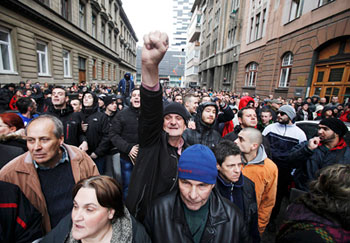

Vol. 78/No. 7 February 24, 2014

|
| Reuters/Antonio Bronic |
| Demonstrations against widespread layoffs, unpaid wages and government corruption started in Tuzla Feb. 4 and have spread across the country. Above, Feb. 9 action in Sarajevo |
The demonstrations started in the industrial city of Tuzla Feb. 4. Laid-off workers from four formerly state-owned companies took to the streets to demand pay and compensation for health care and pensions. These companies had been privatized after the breakup of Yugoslavia, as former state bureaucrats sought to enrich themselves, and the enterprises went bankrupt.
Union leader Dzevad Mehmedovic told Businessweek that workers at detergent factory Dita had not been paid for 26 months. They were joined by thousands of unemployed workers and youth.
Workers marched again the following day. “We have nothing to eat, and you?” said one placard. The protests continued for several days and spread to other cities, including Zenica, Bihac, Mostar and the capital Sarajevo, where demonstrators shouted “Thieves” and “Revolution” in front of government offices.
“People are hungry, young people do not have jobs, there is no health care insurance, no basic rights,” one of the protesters in Tuzla told Balkan Insight Feb. 6. “It can’t get any worse.”
At least 30 protesters and 104 police were injured in Tuzla during clashes in the first three days. According to channelnewsasia.com, police and demonstrators “sprayed each other with tear gas.” Police also attacked the protest in Sarajevo.
Bosnia is fractured along national lines, codified in the U.S.-brokered 1995 Dayton accords, which ended the 1992-95 war. The republic is divided into a Bosnian Serb republic and a Muslim-Croat federation, which in turn is subdivided into 10 cantons, largely segregated by nationality.
But a striking feature of the protests has been the coming together of Muslim, Croat and Serb workers.
Hundreds gathered in Banja Luka, capital of the Serbian part of Bosnia, Feb. 7 to express solidarity with protesters in other parts of the country. In Belgrade, in neighboring Serbia, demonstrators carried handmade signs. “Support the people of Bosnia-Herzegovina! Today Tuzla, tomorrow Belgrade,” read one placard.
“Despair has united the people, Mostar has shown unity for the first time in 20 years,” Dzenan Jelin, an unemployed Muslim, told Agence France-Presse, at a protest in Mostar, a majority Croatian city.
Officially more than one in four Bosnians is unemployed, but Associated Press says the real figure is nearly 40 percent.
Front page (for this issue) |
Home |
Text-version home